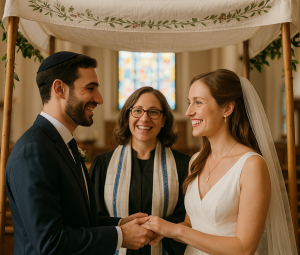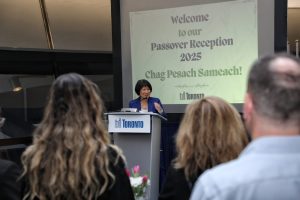 Movie producer Christina Fon is co-producer of Reel Injun, a documentary by Cree filmmaker Neil Diamond that traces the evolution of Hollywood’s portrayal of North American Aboriginal Peoples from the silent era to the present day.(with video)
Movie producer Christina Fon is co-producer of Reel Injun, a documentary by Cree filmmaker Neil Diamond that traces the evolution of Hollywood’s portrayal of North American Aboriginal Peoples from the silent era to the present day.(with video)
Christina Fon
The film – which opened in Toronto and Vancouver on Feb. 19 and will be broadcast by CBC on March 28 – explains through archival clips and interviews how stereotypical depictions of native people have affected their self-image.
The topic has a certain resonance for Fon, a 42-year-old Canadian of Jewish Hungarian extraction.
“I’m a first-generation Canadian whose parents lived through persecution and anti-Semitism during World War II,” said Fon, one of the principals of Montreal-based Rezolution Pictures International.
“My father wore the yellow star, and I was raised in a household that promoted empathy for all oppressed cultures,” she added in an interview.
To Fon, who has produced a slew of films on Native issues since joining Rezolution Pictures International almost a decade ago, Jews and Aboriginals share an important connection.
“The most obvious one is the persecution and the displacement,” said Fon, whose parents, John and Agnes, met in Montreal after separately immigrating to Canada in 1956.
“Native people are very funny. They have the ability to laugh at themselves even in the most difficult and painful situations. This is one of the things that has kept them going throughout their history. Jewish people can relate to this. I can relate to this. I was brought up in a family that definitely used humour to deal with many horrific situations.”
Fon rates Reel Injun as her “proudest achievement.” As she put it, “When you produce a film about an oppressed minority, you bear the weight of that responsibly. You’ve got to get it right.”
As she discovered to her surprise, some of the Aboriginal talking heads in the film are of partial Jewish ancestry, including Jesse Wente, a Toronto movie critic, and musician Robbie Robertson, formerly of The Band, who in recent years has become a Hollywood composer.
A graduate of Concordia University who majored in communications, Fon has produced or co-produced a plethora of award-winning films on Aboriginals in the past nine years.
The River, set on a fictional Native reservation on the Canada-U.S. border where a crime family runs a smuggling operation, will be broadcast on the Movie Network and Movie Central in the near future.
Club Native, filmed in the Mohawk community of Kahnawake, explored the question of who exactly is a Native.
Rez Rides took viewers inside two very different Native custom car shops, while Mohawk Girls explored the lives of teenage girls in Kahnawake.
In addition, she produced three seasons of Dab Iyiyuu/Absolutely Cree, which focused on the legends and wilderness skills of elders; One More River, which told the story of a Cree referendum on a contentious hydro-dam project, and Moose TV, the first all-Native comedy series, which starred Adam Beach.
Fon has also produced general interest films.
Mommy Mommy is about the trials and tribulations of a lesbian couple who want to adopt a child. The Last Explorer, a docudrama about revenge and forbidden love, takes place in the heart of rugged Labrador. Heavy Metal: A Mining Disaster in Northern Quebec looks at a small community devastated and tested by toxic mining waste.
Fon launched her career in Vancouver as an assistant director. “I worked in Vancouver for about two years and returned to Montreal, homesick, as a freelancer to work on various films.”
As far as she is concerned, she was lucky to join Rezolution International Pictures.
“The freelance life was not for me,” said Fon, a mother of two whose husband, Alfonso Maiorana, is a cinematographer.
Her co-principals at Rezolution Pictures International are Ernest Webb, who was raised in a Cree community; Catherine Bainbridge, a Torontonian who was a print journalist and television host, and Linda Ludwick, a Winnipegger who brings expertise in production and finance to the mix.
“In Webb, Bainbridge and Ludwick, I found a group of people who were not ‘industry types’ but creative people who wanted to do work that made a difference. Native, Irish, Jewish and gay. That’s us. Despite the diversity of our backgrounds, we function as a single unit. It’s a rare blessing when your best friends are also cherished creative partners.”






